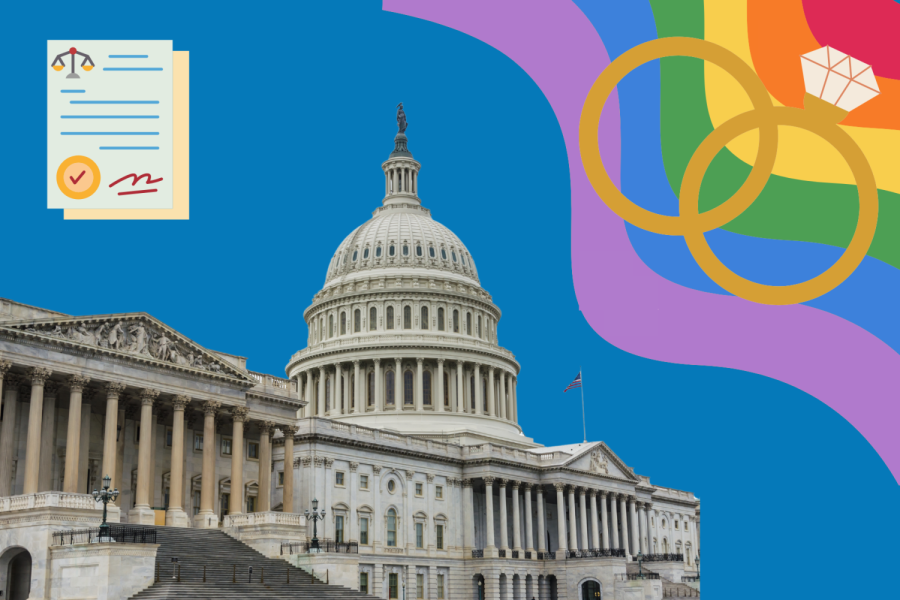Respect for marriage act
New law creates federal level safe guard on marriage
Digitally constructed image created by Zoey Wilcox that represents the factors that play into the law President Biden signs into effect over marriage equality.
January 10, 2023
On Dec. 13, 2022, U.S. President Joe Biden signed the Respect for Marriage Act (RFMA) into law, effectively deciding that the federal government will respect all marriages from same-sex and interracial couples.
While the law will guarantee federal recognition of same-sex and interracial marriages, it was passed through Congress essentially as a compromise and as a backstop. In the case that the Supreme Court overrules prior decisions, which are currently the legal basis for such rights.
Bill Timeline:
- The Act passed the House in a bipartisan vote on Jul. 19, 2022.
- Senator Tammy Baldwin of Wisconsin announced on Nov. 14, 2022, that a bipartisan deal had been struck, and that they expected the legislation to reach 60 votes to break the filibuster.
- A motion of cloture passed 62–37 in the Senate on Nov. 16, 2022.
- On Nov. 29, 2022, the Senate passed it by a 61–36 vote, with a large majority of Senate nays originating from Republican Senators in the Southern United States.
- On Dec. 8, 2022, the House agreed to the Senate amendment by a 258–169 vote, with one member voting abstained. Surprisingly, 39 Republicans voted in favor.
- President Biden signed the bill into law on Dec. 13, 2022.
Congress re-introduced the Respect for Marriage Act bill in July of 2022 after concerns involving the remaining legality of same-sex and interracial marriages began to arise after the overturning of Roe v. Wade in June.
Americans began to be concerned that equal marriage protection was in danger after Supreme Court Justice Clarence Thomas issued a statement. They then turned to social media with fear, outrage, and concern. As a result of these outcries, Democratic representatives also began to have similar concerns. They feared that same-sex marriage would be among the next issues to be targeted by the conservative majority on the Supreme Court.
Initially, the RFMA bill was created in 2009 by former Republican U.S. Rep. Bob Barr in response to the Defense of Marriage act. This bill banned the federal recognition of same-sex marriage by limiting the definition of marriage to a “union of one man and one woman.” The bill was re-introduced in Congress multiple times but never gained popularity until this year.
“Couples joining in marriage deserve to have the dignity, stability, and ongoing protection that marriage affords to families and children.” The RFMA states, “For the purposes of any Federal law, rule, or regulation in which marital status is a factor, an individual shall be considered married if that individual’s marriage is between two individuals and is valid in the State where the marriage was entered into or, in the case of a marriage entered into outside any State if the marriage is valid in the place where the marriage [took place].”
However, despite the belief of many Americans, the RFMA will only partially protect the legality of same-sex marriage. That will still rest upon the 2015 Supreme Court case Obergefell v. Hodges, which found that the 14th amendment constitutionally protects same-sex marriage
The RFMA is a safeguard in case the Court were to overturn Obergefell, in which case the legality would revert to state law. So the bill instead requires all states to recognize same-sex and interracial marriages performed in other states where it is considered legal and federally recognizes these marriages.
“The Respect for Marriage Act does not guarantee the right to marry,” CNBC stated in an article written on Dec. 13, 2022. “It specifies that states must recognize same-sex marriages across state lines and that same-sex couples have the same federal benefits as any married couple.”
“RFMA also offers explicit protections for religious groups with moral objections to same-sex or interracial marriages,” ABC News said. “They are not required to provide goods or services to the marriages they object to and their tax-exempt status cannot be rescinded for refusing to perform or respect a marriage.”
When it comes to interracial marriage, the country had seen continually improving shifts in public opinion and acceptance since 1967, when the Supreme Court ruled in Loving v. Virginia that prohibitions on interracial marriages were unconstitutional. In 1958, when polls were first posted, just 4% said they approved of marriage between black and white people.
Through the mid-’90s, Americans were still split on the subject. However, by the late-’90s and early 2000s, support for interracial marriage soared, and by 2021, approval hit a sky-high 94%. Having the RFMA include interracial marriage in the bill serves yet again the purpose of federally recognizing all types of marriages, including interracial couples.
“The House’s bipartisan passage of the Respect for Marriage Act—by a significant margin—will give peace of mind to millions of LGBTQI+ and interracial couples who are now guaranteed the rights and protections to which they and their children are entitled,” President Biden said.
What’s next?
Under the assumption that the Supreme Court will not be overturning previous cases that protect the rights of same-sex and interracial marriage any time soon, advocates are now trying to strengthen related laws further. Currently, advocates are pushing for the Equality Act, a bill that would ban discrimination based on sex, sexual orientation, and gender identity and expand the definition of public accommodations. It passed the House in February 2021 but stalled in the Senate due to Republican opposition, in part of tight restrictions on religious liberty exemptions.
“Today, Congress took a critical step to ensure that Americans have the right to marry the person they love,” President Biden said.








